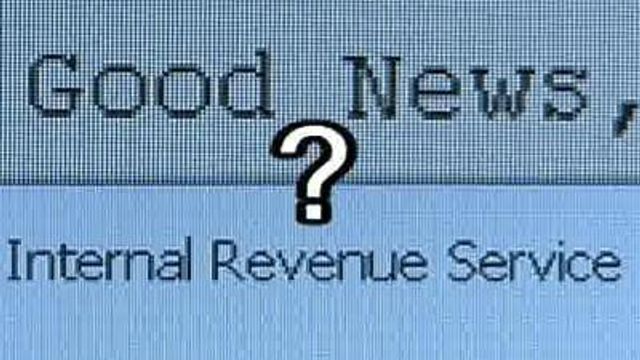'IRS' E-Mail Scam Aims at Snaring Identity
The IRS is warning Internet users to be on alert for an e-mail that promises a refund and asks users to enter their bank card information. The e-mail appears to come from an address ending in "IRS.gov."
Posted — UpdatedNo one expects good news from the Internal Revenue Service, but an e-mail scam promises exactly that.
The IRS is warning Internet users to be on alert for an e-mail that promises a tax refund and asks users to enter their bank card information. The e-mail appears to come from an address ending in "IRS.gov."
The IRS said almost 18,000 people have reported similar e-mails. Investigators identified host sites from the e-mail originated in 28 countries, including the United States.
John Radford, who received the scam e-mail, said the promise of "Good news!" tipped him off that the e-mail might be bogus.
"You're getting an e-mail from the IRS, but then it doesn't say 'dear so-and-so.' It just says 'good news,' and you start to smell something right there," Radford said. "And as you call it, you smell a phish."
The e-mail says recipients are "eligible to receive a tax refund of $93.82" and asks them to click a link and then enter their bank card information. The e-mail says the IRS will accept only cards linked to checking or savings accounts.
"See, that's the phishing hook going right there," Radford said.
Even users who don't enter their card information place themselves at risk for identity theft if they click on the link or open attachments from the e-mail.
"They concentrate on that dollar sign, and then they concentrate on that link. They click on it, and then they've stepped on a little land mine," Radford said.
The IRS said that in other e-mail scams, recipients were told the agency was investigating them for submitting a false tax return. Another scam catches recipients by suggesting an anti-fraud commission is investigating their tax return.
"It's real scary. It's cyber-scary," Radford said.
5 On Your Side cautions that the IRS and other reputable institutions never use unsolicited e-mails to ask for personal information.
Radford likened the scam to a stranger asking for the keys to your house.
"We've met what, five minutes ago? And suppose you say, 'Let me have the key to your house now that we've met,'" Radford said. "That's what I equate it to."
• Credits
Copyright 2024 by Capitol Broadcasting Company. All rights reserved. This material may not be published, broadcast, rewritten or redistributed.





